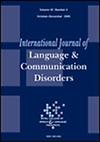Acknowledging a Stutter Affects the Impression One Makes in a Job Interview
Abstract
Background
People who have a stutter are often viewed negatively by others. Acknowledgement—defined as notifying others up front about characteristics that might lead one to be evaluated negatively—might be an effective impression management strategy for people stigmatized by stuttering. Past research testing this hypothesis, however, has produced inconsistent findings.
Aims
To assess the effectiveness of acknowledgement by people who stutter as a strategy for eliciting more positive evaluations from others while controlling for possible methodological problems in past research. Participants were expected to be more likely overall to find job applicants without a stutter to be better candidates for a job than those with a stutter. However, it was also hypothesized that this difference would not be significant when candidates with a stutter acknowledged it.
Methods & Procedures
Participants watched two simulated job interview videos: in one, the applicant had a stutter, and in the other, they did not. For half of the participants, the applicant who stuttered acknowledged the speech dysfluency at the beginning of the job interview. After watching each interview, the participants rated the interviewee.
Outcomes & Results
The results revealed the predicted significant interaction between stuttering and acknowledgement: acknowledgement of the stutter led the stuttering job candidate to be evaluated just as positively as the non-stuttering job candidate.
Conclusions & Implications
This research has implications for the kind of advice practitioners can offer people anticipating interactions (such as job interviews) where they will be evaluated. The findings also potentially widen the range of circumstances in which acknowledgement can be used to counteract the negative impressions people might be biased to form of stigmatized individuals.
What This Paper Adds
- Previous research shows that acknowledging a stigmatized identity (and other forms of acknowledgement) upfront before interacting with others in an evaluative context (such as a job interview) can often improve the impression one makes and how one's performance is perceived. However, past research evaluating this strategy in the case of stuttering has produced inconsistent findings. In addition, some past research suggests that acknowledgement might not be effective when the source of stigma is perceptually salient during the interaction.
- The results of this study, designed to control for possible methodological problems in past research, indicate that acknowledgement can in fact be an effective impression management strategy for people who stutter.
- This research has implications for the kind of advice practitioners can offer people anticipating interactions (such as job interviews) where they will be evaluated. In short, it provides a method for trying to reduce the discrimination a person who stutters might face.

 求助内容:
求助内容: 应助结果提醒方式:
应助结果提醒方式:


